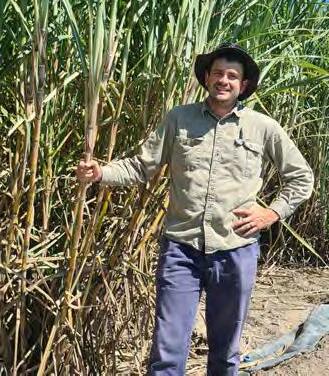
3 minute read
Planning and shared interests are the secrets to success
A group of young growers are sharing their best farming experiences to adopt farming best practices to maximise their returns, but it doesn’t come easy – planning and shared interests are the secrets to successful networking.
The Proserpine Young Farmers Group boasts more than 40 members and is delivering networking opportunities plus genuine, usable information for sugar cane producers to improve their farming practices and reduce run-off into the reef.
Advertisement
One of the early supporters of the group, and current treasurer, was Justin Blair, a CANEGROWER member from Proserpine.
Mr Blair, pictured, farms 300 hectares of sugarcane, producing between 16,000 tonnes in a dry year and 24,000 tonnes with good moisture.
Mr Blair said planning and advanced notice was one of the keys to holding a successful event for the group.
"We mostly try and plan things in the offseason," he said.
"It seems like it is hard to get young farmers, or farmers in general, around to the regular meetings but if we plan out something that people see the value in going... we get support," he said.
The Proserpine Young Farmers group consists of members under the age of 40, with growers, harvest operators, haulout drivers, accountants, engineers and agronomists involved.
The topics discussed within the group include best farming techniques for chemical use, ground preparation, rotational crops, spray calibration, precision agriculture, drone use, sugar pricing and marketing, pest control, water and soil testing and fertiliser efficiency.
By sharing their experiences, the group is able to help each other adopt farming best practice to maximise returns while also minimising run-off of nutrients, chemicals and sediment into reef catchments.
The Queensland Department of Agriculture and Fisheries (DAF) is working with peer-to-peer groups like the Proserpine group to enable the adoption of best farming practice to grow the economy and safeguard the natural environment.
DAF funded the group as part of its Reef Water Quality Improvement Program so they could see first-hand examples of best practice farming improving production and reducing run-off into the reef.
Recent research by DAF shows almost 60 per cent of producers use peer to peer groups and 80pc say other farmers are their most trusted source of information about farming best practice.
Mr Blair said it was important the group as a whole guided what they wanted to learn about.
"Once we find out what the group wants to learn, it's really easy to find someone that's keen just to do it, do a workshop and present to the group," he said.
There have been field trips to farms outside the region, and even one to the Hay Point coal terminal to see how that business manages its environmental requirements.
In line with that, the group has been able to purchase a flow metre so members can investigate their irrigation and water usage with the intent of managing it better.
"Once you know how much water you are putting on you can see if you need to adjust it," Mr Blair said.
For Mr Blair's own operation, like most in the district, the farm is reliant on rainfall with a relatively conservative 1 - 1.5 megalitre water allocation used to top things up when needed.

Information supplied by Queensland Department of Agriculture and Fisheries.






